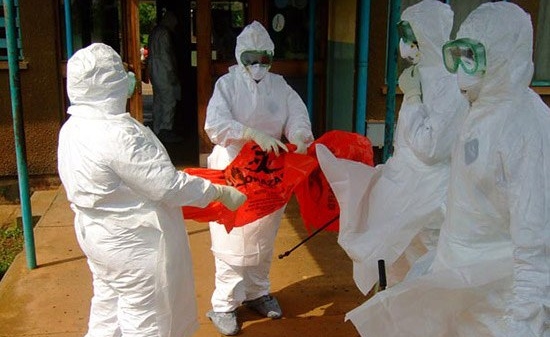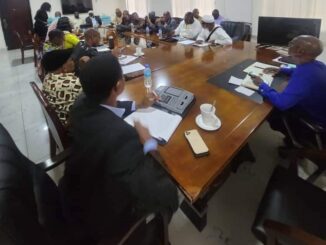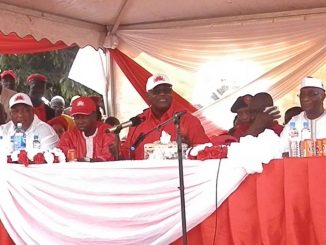
-
Six-year-old Fatou was exposed to Ebola at her uncle’s funeral in Forécariah, a district along Guinea’s border with Sierra Leone where about 50% of all Guinea’s Ebola cases since February 2015 have occurred.1 Fatou’s entire family was registered as contacts to be monitored for the next 21 days, during which the disease could develop.
A contact tracer began making daily visits to check their temperatures and evaluate them for symptoms. For the first few days, everything seemed fine, but on the fifth day, Fatou was found to have fever and vomiting.
A response team was dispatched to bring her to the Ebola treatment center for testing, but Fatou’s grandmother vehemently refused. “You are going to cut her into pieces!” she screamed. The team tried to reassure her, but to no avail. The grandmother ran outside and called her neighbors. “Help me! They are trying to kill my grandbaby!” A swarm of people from the neighborhood quickly converged on the home. Sensing the anger in the crowd, the response team withdrew to safety.
By now, the sun was setting and the response team decided to return the next morning, though they knew that by then Fatou would most likely have been hidden. If her symptoms were from Ebola, she had already exposed many people in the neighborhood and would spur another chain of transmission.
The following day, the response team came back, this time accompanied by gendarmes in case the neighborhood turned on them again. As expected, Fatou’s grandmother reported that Fatou was gone — she had traveled to another village. Then, seeing the officers outside, she relented. “This must be serious if they are here,” she remarked. She confessed that Fatou was in fact inside and agreed to let her be tested, but only if she could come along.
For us, this incident illustrates the challenge of gaining trust and the importance of respect as Ebola response teams engage with communities and try to end the epidemic. In Guinea, community distrust enables Ebola to persist in areas where people continue to hide the sick, conduct funerals in secret, and elude contact tracing. In May, cases resurfaced in places thought to be free from the virus, and even in known hot spots, some infections arise from unknown transmission chains, suggesting that other cases may be hidden.1 We need to build trust with communities and enhance their respect for response efforts if we are to overcome these challenges and bring the epidemic to an end.
Communities are not uncooperative because they are backward or uneducated. On the contrary, they harbor a distrust of Ebola response efforts that is completely rational, given their experience during recent decades of misrule and political tumult. After 24 years of dictatorship marked by economic mismanagement, endemic corruption, and political repression, Guinea was taken over by a military junta in 2008 and held democratic elections only after great violence: a 2009 protest ended with the massacre of more than 150 people, and months later the leader of the military regime was shot in an assassination attempt. Alpha Condé, Guinea’s current president, came to power in a polarizing 2010 runoff election. After a failed coup d’état in 2011, parliamentary elections were delayed several times owing to political tensions, and local elections scheduled for 2014 have yet to take place. Despite gains in establishing rule of law and economic growth since 2010, the legacy of past misrule and political upheaval lingers today as Guinea — even with the ongoing epidemic — heads toward a presidential election in October.2
Such complex historical circumstances fuel distrust of formal power structures — and Ebola response efforts. Rumors abound that Ebola has been deliberate-ly propagated as a ploy for entrenched interests to pocket money donated for the response. When people involved in the funeral of someone who has died of Ebola do not subsequently develop the disease, rather than consider them lucky, communities take it as evidence that Ebola is not what they have been warned to believe and may just be a hoax.
For communities with such deep distrust and little exposure to modern medicine, cultural and religious beliefs serve as touchstones. So when response teams propose changing the conduct of funerals — rituals that, in local traditions, have deep implications for the soul — communities are reluctant to comply.
Overcoming this distrust is essential for ending the epidemic in Guinea. In Liberia, Sierra Leone, and areas of Guinea affected earlier in the epidemic, “apocalyptic” transmission — dead bodies in the street, entire villages nearly wiped out — jolted communities into believing in the reality of Ebola and cooperating with response efforts. These shocks generated abrupt change, but how can buy-in be garnered without communities first enduring such intense suffering?
Trust can be built by sitting, community by community, with local leaders and community members, listening to their concerns with empathy, and incorporating their preferences into the implementation of control measures, such as changes to funeral practices. This approach has worked where it has been executed well, but it is time-consuming and requires skilled interlocutors, especially given the diversity of cultures present in the areas still affected by Ebola. A surge of anthropologists has recently been deployed to hasten this process.
Trust can also be furthered by bolstering general health systems. Death and suffering from more common diseases, such as malaria and pneumonia, continue unabated, even while Ebola response teams assure communities that they are there to protect their health.3 Many communities do not perceive a difference between Ebola and these other health problems, seeing them all as illnesses for which they need help. When they cannot find care for a child with diarrheal disease, they question the sincerity of response teams that seem eager to help them with Ebola.
Although these approaches take time, the response could more immediately gain buy-in from communities by cultivating greater credibility and respect. In Liberia and Sierra Leone, the presence of American or British troops helped give the Ebola response an air of authority and urgency.4 The response in Sierra Leone continues to be run through the country’s defense ministry. In contrast, Guinea has not had support from a foreign military and, because of its history, did not deploy its own army. However, the gendarme force, which is distinct from the army and has already been involved in providing security for response teams, could be more integrated into the response to leverage its discipline and gravity as a gateway for initial cooperation that can lead to further engagement.5
In the end, the response team and the gendarmes escorted Fatou and her grandmother to the laboratory. During testing, Fatou’s grandmother remarked on how nicely Fatou was treated. After her test came back negative for Ebola, the gendarmes courteously dropped them back at home. Fatou’s grandmother thanked them for their kindness and for making sure that her granddaughter was OK.
The patient’s name has been changed to protect her privacy.



